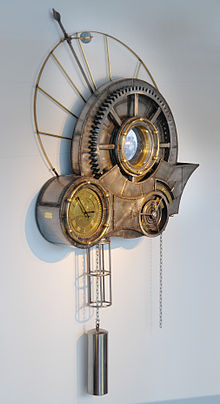- Clockwork universe theory
-
The clockwork universe theory compares the universe to a mechanical clock wound up by God. It continues ticking along, as a perfect machine, with its gears governed by the laws of physics, making every single aspect of the machine completely predictable. Before the emergence of chaos theory and quantum mechanics, many scientists believed that the Universe was completely deterministic in this way.
What sets this theory apart from others is the idea that God's only contribution to the universe was to set everything in motion, and from there the laws of science took hold and have governed every sequence of events since that time. This idea was very popular among deists during the Enlightenment, when scientists realized that Newton's laws of motion, including the law of universal gravitation, could explain the behaviour of the solar system.
Contents
Opposition
Suggested arguments against this theory include: the concept of free will; the second law of thermodynamics (the total entropy of any isolated thermodynamic system tends to increase over time, approaching a maximum value); and quantum physics with its mathematical description of unpredictable, random behaviour.
Isaac Newton has been recognized as a prominent opponent of the clockwork universe theory, though the theory has often been wrongly attributed to him. Edward B. Davis has acknowledged Newton's belief that the clockwork universe theory wrongly reduces God's role in the universe, as reflected in the writings of Newton-supporter Samuel Clarke. Responding to Gottfried Leibniz, a prominent supporter of the theory, in the Leibniz–Clarke correspondence, Clarke wrote:
"The Notion of the World's being a great Machine, going on without the Interposition of God, as a Clock continues to go without the Assistance of a Clockmaker; is the Notion of Materialism and Fate, and tends, (under pretence of making God a Supra-mundane Intelligence,) to exclude Providence and God's Government in reality out of the World."[1]
World-machine
A similar concept goes back, to John of Sacrobosco's early 13th-century introduction to astronomy: On the Sphere of the World. In this widely popular medieval text, Sacrobosco spoke of the universe as the machina mundi, the machine of the world, suggesting that the reported eclipse of the Sun at the crucifixion of Jesus was a disturbance of the order of that machine.[2]
This conception of the universe consisted of a huge, regulated and uniform machine that operated according to natural laws in absolute time, space, and motion. God was the master-builder, who created the perfect machine and let it run. God was the Prime Mover, who brought into being the world in its lawfulness, regularity, and beauty. This view of God as the creator, who stood aside from his work and didn’t get involved directly with humanity, was called Deism (which predates Newton) and was accepted by many who supported the “new philosophy”.
Art
In 2009 artist Tim Wetherell created a large wall piece for Questacon (The National Science and Technology centre in Canberra, Australia) representing the concept of the clockwork universe. This steel artwork contains moving gears, a working clock, and a movie of the moon's terminator in action.
See also
References
- ^ Davis, Edward B. 1991. "Newton's rejection of the "Newtonian world view" : the role of divine will in Newton's natural philosophy." Science and Christian Belief 3, no. 2: 103-117. Clarke quotation taken from article.
- ^ John of Sacrbosco, On the Sphere, quoted in Edward Grant, A Source Book in Medieval Science, (Cambridge: Harvard Univ. Pr., 1974), p. 465.
- "A Short Scheme of the True Religion", manuscript quoted in Memoirs of the Life, Writings and Discoveries of Sir Isaac Newton by Sir David Brewster, Edinburgh, 1850; cited in; ibid, p. 65.
- Webb, R.K. ed. Knud Haakonssen. "The Emergence of Rational Dissent." Enlightenment and Religion: Rational Dissent in Eighteenth-Century Britain. Cambridge University Press, Cambridge: 1996. p. 19.
- Westfall, Richard S. Science and Religion in Seventeenth-Century England. p. 201.
Further reading
- Dolnick, Edward, The Clockwork Universe: Isaac Newton, the Royal Society, and the Birth of the Modern World, Harper Collins, 2011.
External links
- "The Clockwork Universe". The Physical World. Ed. John Bolton, Alan Durrant, Robert Lambourne, Joy Manners, Andrew Norton.
Categories:
Wikimedia Foundation. 2010.

